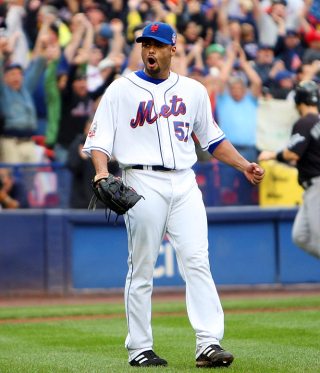I lied when I said this would be a four-part series. I’m running out of steam and ways to say “hope,” so it’ll be three parts. Then for good measure, I’ll throw in a metaphor-heavy summary-type thing pre-previewing the 2011 Mets. That could come later today or tomorrow, depending on how busy I get with other nonsense.
 This is the one about the pitching staff.
This is the one about the pitching staff.
The rotation: First things first, in a best-case scenario, Johan Santana stays mostly healthy. Given the nature of his injury and recovery, I’d say the best you could reasonably hope for is 25 starts at a solidly above-average but sub-Santanan level.
R.A. Dickey, we know, is totally sweet. And though Dickey’s ERA jumped a little last year, his rate stats all stayed remarkably consistent with his breakout 2010 campaign. The best we can hope for is another season of good health, great facial hair and great knuckleballs from Dickey, all of which should make him — hard as some find this to believe — among the top 25 starters in the league. Perhaps not a True No. 1 Ace, but a legit frontline starter regardless.
Jon Niese is more of a wild card. Niese’s peripheral stats indicate he might be very good, but he has a nasty habit — or, depending on whom you ask, the nasty misfortune — of allowing a ton of base hits. I’m not sure it’s likely, but I think it’s fair to hope the still-young Niese stays strong and healthy through the season, lives up to those peripherals and joins Dickey on the outer fringes of Ace-dom with an ERA in the low 3s.
Mike Pelfrey we’ve pretty much got pegged by now. He’s going to yield a lot of balls in play. The hope is that the Mets prove better than we expect at turning those into outs (or Pelfrey enjoys a run of great luck) and eats up 200 palatable innings with an ERA around 4.
For Dillon Gee, as with all pitchers, the everything-falls-right scenario must include a seasons’ worth a full health — no safe bet. And given Gee’s underwhelming peripherals in 2011, it’s hard to hope for more than the modest improvements suggested by all three of his projections on Fangraphs. In the interest of optimism, though, it’s worth noting that Gee struck out four times as many guys as he walked in the Minors.
And of course, if we’re talking about absolutely everything falling right — and we are, remember — then by sometime in the middle of the season one of Matt Harvey and Jeurys Familia will prove ready for prime time and an improvement over some member of the big-league rotation. Pitching prospects being pitching prospects, it’s probably unreasonable to expect success from both even for the purposes of this exercise. Which one surfaces first is anyone’s guess: Familia has had more success and a handful more starts in Double-A to date, but most prospectors are higher on Harvey.
The bullpen: The Mets put a lot of work into their bullpen this offseason, but bullpen construction tends to be something of a crapshoot. The Mets’ 2012 bullpen looks to have a nice combination of guys with histories Major League success, guys who can actually strike people out, guys who throw really hard and guys who can occasionally find the plate, though, so it’s not crazy to imagine them having one of the league’s better relief corps. It really only requires a couple of dudes having good seasons.
So here’s what I’ve got: I’m painting with very broad strokes here and doing all sorts of shoddy math, but the way I see it if absolutely everything falls right for the Mets, they could get about 33 wins’ worth of production beyond the replacement level from their position players and maybe 14 from their pitchers. If a replacement-level team can be expected to produce about 47.4 wins, these Mets, in this best-case scenario, would wind up with about 94.
Again: I can’t stress enough how inexact a science this is. And I guess the conclusion really isn’t all that stunning: If the Mets enjoy an unprecedented run of good health and every single player on the team produces as well as anyone could reasonably expect at the season’s outset, the team would be good enough to make the playoffs. I expect this would prove true for most teams. And that doesn’t really account for any unexpected Jose Bautista success, which happens on rare occasion (and to lesser degrees than Bautista’s, of course), or much assistance from the farm system.
The counter, of course, is that the Mets need nothing to go wrong to get to 94 wins, and several things will inevitably go wrong. How many things and how wrong they go will determine how far away the Mets finish from their best possible outcome, and since their best possible outcome is probably only a Wild Card berth, it doesn’t make a postseason run look particularly likely.
But in short: The good news is the Mets do probably have the talent to get to the playoffs if absolutely everything goes right. The bad news is that never happens, and they don’t have a lot of flexibility for when it doesn’t.
